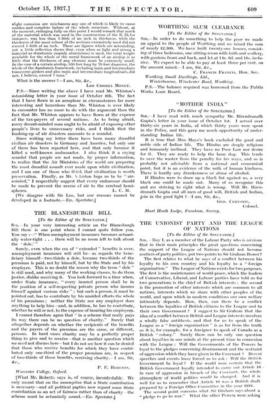THE UNIONIST PARTY AND THE LEAGUE OF NATIONS
[To tlw Editor of the SPECTATOR.] SIR,—May I, as a member of the Labour Party who is anxious that in their main principles the great questions concerning the support of the League of Nations should not become matters of party politics, put two points to Sir Graham Bower?
The first relates to what he says of a conflict between his loyalty to his own country and his loyalty to a " foreign organization." The League of Nations exists for two purposes. The first is the maintenance of world-peace, which the leaders of Conservative, Liberal, and Labour parties have told us for two generations is the chief of British interests ; the second is the promotion of other interests which are common to all nations, interests which we share with other peoples of the world, and upon which in modern conditions our own welfare intimately depends. How, then, can there be a conflict between the loyalties of British citizens to the League and to their own Government ? I suggest to Sir Graham that the idea of a conflict between British and League interests involves a wholly false antithesis, and that for us to speak of the League as a " foreign organization " is as far from the truth as it is, for example, for a foreigner to speak of Canada as a British " colony." Surely there can be only one question about loyalties in our minds at the present time in connexion with the League : Will the Governments of the Powers be loyal to the pledges concerning disarmament and the restraint of aggression which they have given in the Covenant ? Recent speeches and events have forced us to ask : Will the British Government be loyal ? If the world were certain that the British Government loyally intended to carry out Article 16 in case of aggression in breach of the Covenant, the whole atmosphere of world politics would be changed. And it is well for us to remember that Article 16 was a British draft prepared by a Foreign Office Committee in the year 7918.
The second point concerns what Sir Graham says about a " pledge to go to war." What the other Powers were asking
of Great Britain in Geneva two weeks ago was not a pledge to go to war, but a pledge not to go to war. . The first week of the Assembly was largely occupied with private negotiations in which, as everybody knew, certain delegations were endeaVouring to secure a resolution by the Assembly forbidding all war and " closing the gap " for recourse to arms which Article 15 still allows. The resolution, when it ultimately 'appeared, did not " close the gap " but simply confirmed the Covenant as it stands, for the reason, so it was universally 'believed in the Assembly, that the British Government refused to accept it unless the right of war remained. The subsequent pfiblic proceedings unfortunately put it beyond all doubt that we, and, except for Fascist Italy, we alone, insisted on retaining this right of private war.
Are Conservatives, is Sir Graham, ready to ask their Govern- ment to give new pledges to the world that they are loyal to Article 16 and that they will give up the right of private war ? If they are, we may be certain that a real and solid step towards disarmament can be made, and made at once.— I_ am, Sir, &c., P. J. NOEL BARER. 43 South Eaton Place, S.TV.1.



















































 Previous page
Previous page